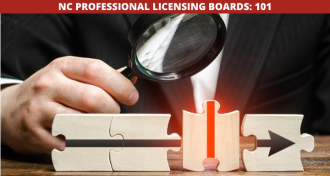Knowing the legislative mandate (i.e. the mission) of a licensing body is a crucial step in understanding its scope of authority to govern the licensed professionals subject to its authority.
This article provides a brief overview of the mission of the North Carolina Department of Insurance (NCDOI).
The answer to the question "What is the NCDOI's legislative mandate" (that is, what is its mission) can be found in Section 58-2-1 of Chapter 58 of the North Carolina General Statutes. In that Section, the North Carolina General Assembly charges the NCDOI "with the execution of laws relating to insurance and other subjects placed under the Department."
Enlightening, right? Not so much as a standalone statement, but when read in conjunction with the broader context of Chapter 58, the NCDOI's mission is clear. Its goalposts are primarily two-fold: (1) to protect the public and (2) to establish and regulate industry standards. The latter goalpost exists primarily to serve the purpose of the former and, perhaps to a lesser extent, the reputation of the industry the NCDOI governs. The word "public" appears over 862 times in Chapter 58; "consumer" appears over 150; "protect" or some variation of it like "protected" or "protection" appear over 800; and "standard" appears over 590 times.
At its core, the mission of the NCDOI is not really different than that of many licensing bodies that govern the various occupational licenses in North Carolina. Many of those bodies' core missions mirror that of the NCDOI's mission for the respective licensed occupations they are charged with regulating.
Since a licensing body's mission tends to inform and shape more or less everything it does, it is mission critical for licensees to understand their licensing body's mission. This general principle applies no less to licensees of the NCDOI. Appreciating that the overarching aim of the NCDOI is consumer protection can provide licensees with significant insight into how the NCDOI approaches matters like licensing, registration, investigations, and disciplinary action.
In the context of disciplinary action, for example, the NCDOI's primary objective speaks in no small part to why the disciplinary action that the NCDOI takes against a licensee is publicly available on its website for the world to view. Settlement agreements of disciplinary disputes entered between a licensee and the NCDOI are not even shielded from public disclosure, though certain information may be redacted in the versions accessible by the public. The aim of consumer protection is served through the accessibility of this information in that should consumers so choose, they can research licensees they seek to do business with to determine if those licensees are in good standing with the NCDOI and whether they have a record of disciplinary action. It also sheds light on the abundance of consumer-oriented information and resources made available by the NCDOI.
Keeping in mind the NCDOI's mission should be a high priority and is an important self-help step that any licensee facing a disciplinary proceeding or navigating other regulatory action or matters with the NCDOI can take. That said, and even when a licensee has the NCDOI's mission in mind, navigating regulatory actions, particularly investigations and disciplinary proceedings, without the benefit of legal counsel is not without risk. A discussion of the investigatory and disciplinary process that the NCDOI utilizes when investigating complaints made against its licensees and the types of regulatory action that it can take against its licensees is beyond the scope of this article. For information on that topic, refer to our article titled "Understanding the Basics of NCDOI Licensee Complaints."
Ward and Smith has a dedicated Professional Licensing Group comprised of a team of attorneys with a wealth of experience representing licensees through investigatory and disciplinary proceedings before the State's various licensing boards, including the North Carolina Department of Insurance.








